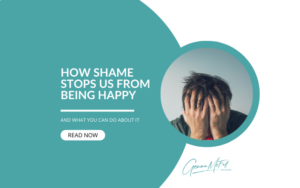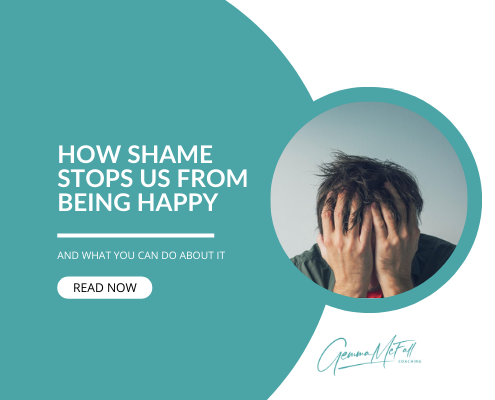What’s wrong with your personality?
“I know I shouldn’t be such a people pleaser”
“Everyone tells me I have too much empathy”
“I wish I were better at handling confrontation”
These are just some examples of things I often hear from clients.
Are we all secretly ashamed of being ourselves?


Dr Brené Brown, a research professor who’s spent the past two decades studying shame describes shame as the intensely painful feeling or experience of believing that we are flawed and therefore unworthy of love and belonging.
I used to feel ashamed of my weakness, my lack of confidence and my doubt. Why is everyone else so much more competent than me? Why do they seem to breeze through life with so much ease?
So where does this shame come from?
I’m going to suggest where our shame comes from, how it stops us from being happy, and what you can do about it.
That is unless you want to go on wishing you had a different, better personality and living with shame. In which case go grab yourself a cuppa and snuggle down in front of Netflix.
I’ve chosen to use the word ‘strength’ when referring to personality traits or talents that are unique to you. Why? Because I’m a Strengths Coach and I deeply and completely believe in the strengths approach.
The Shoulds…
Ever noticed that we have a list of everything we ‘should’ be.
‘Should’ according to who?
“You need empathy to be successful” – Do you?
“You will never get anywhere if you are not organized” – Is that true?
“Dealing with conflict is something you should be able to do as you get older” – Why?
These are some of the ‘shoulds’ that Kate, a recent client of mine, wanted me to help her with during a coaching session. It’s no surprise that she had been carrying years of shame because she can’t do these things that society tells her she should.
Despite what we’ve been led to believe, we don’t need to be well rounded. We don’t need to be good at everything. Attempting this is never-ending and truly exhausting.
You were told to stop being you
Kids can be annoying.
They are 110% authentic. They haven’t yet learnt to be ashamed of who they are.
If they have a strength in communication this could look like verbal diarrhoea and a kind parent is constantly telling them to be quiet.
Maybe their strength is questioning things and drive us mad asking more questions than is needed for the simplest of things. What if our reply was ‘stop asking questions just get on with it?’
Or finally, we all know a child who is ‘bossy’. Is it bossy? Or is she one of our next great leaders in the making?
It doesn’t take long before a child learns to be ashamed of their strength and stop being themselves and very soon they could become watered-down versions of themselves without ever having the opportunity to grow into their greatest strengths.
Your strengths were not recognized
Is it possible that your strengths were never spotted or valued by your family because you were different?
Kids just want to fit in. When our uniqueness goes unnoticed, we quickly learn to hide it and try and conform.
A friend of mine, Sam grew up in a family that loved to reminisce and talk about the past. But he preferred to dream about the possibilities of the future. As a child, he couldn’t find his place in the conversation.
Sam assumed for years there was something wrong with him.
By not recognizing other’s strength we’re implying it’s not something to be proud of.
Your parents chose not to shine
Growing up with a parent who lacks confidence and who is in the habit of highlighting their flaws, teaches us to do the same.
Clients often say… ‘I get this [insert strength they don’t like] from my Mum’
What if their Mum had done a better job of embracing this strength and showcasing how to shine with it?
When our parents wish away their personality it sends a crystal clear message to us to do the same.
Your school didn’t cater to your strengths
You could have spent 12 years or more at school and still not figure out what you’re good at.
The current school system does a great job at teaching and measuring academic subjects.
But what about kids whose strengths lie in leadership, influencing, problem solving, kindness or conflict negotiation.
There may have been fleeting moments when if you were, lucky a group project or an after-school activity gave you the chance to shine.
But ultimately your grades still only reflect the academics.
Your boss says you’re not good enough
If you managed to survive childhood without adopting any shame around who you are…congratulations…
You’re in the minority.
But you are not out of the woods yet…
You get a job. You have a boss. You attend your performance review.
And guess what?
You discover a whole load of development areas that you didn’t know you had. You best start working on fixing these things that are wrong with you if you want that promotion.
This was me.
The day I discovered my boss was less than impressed with my ability to create a perfect budget I threw myself into online finance courses.
I found it boring and soul-destroying. I started pulling long hours at work to try harder. I believed to progress further I would need to fix this massive shortfall I had.
And so my professional shame began.
Your partner tries to change you
And lastly… When we find our perfect partners.
We are in owe of them.
They somehow seem to complete us. They’re everything we’re not.
But… shortly after the honeymoon phase these same strengths that once were so attractive start to grind on us.
We do everything we can to try and change them. To be just a little more like us.
Whilst at the same time… they are feeling the same and secretly trying to change us too.
Eventually, any shame you had around yourself will sneak back to the surface as your partner once again highlights your personality defects to you.
What can we do about shame?
The solution to our shame problem is simple.
It’s time to come out of the personality closet.
It’s time to be unapologetically you.
Dr Brené Brown said, “We cultivate love when we allow our most vulnerable and powerful selves to be deeply seen and known”.
But how can we allow others to see us when we can’t see our strengths?
It’s easy to list our flaws but it’s not so easy to list our strengths.
Why? Because it’s hard for us to see what’s special about something we have lived our whole lives with.
We take our strengths for granted.
How do we find our strengths?
It’s possible to discover our strengths by listing our annoying traits and then flipping them. Most weaknesses can translate into a strength.
You might avoid confrontation (perceived weakness), but you’re amazing at identifying and understanding the wants and needs of others (strength).
Once you have your list of annoying traits and your strengths you have a great starting point.
And yes. It will boost your confidence.
You may find you have a long list of vague strengths but with this method, you run the risk of missing some of your key strengths.
You may have strengths buried so deep inside that neither yourself nor others can identify.
The personality game changer
A more effective way to discover your greatest strengths is to take Gallup’s Clifton Strengths Assessment.
The 45-minute online assessment predicts with surprising accuracy your top 5 natural strengths. So, you know exactly where to focus your energy to shine.
This was a game-changer for me both personally and professionally.
Discovering my top 5 strengths was like having a huge weight lifted from me.
I no longer needed to pretend to be a finance wizard. And I also stopped acting like a chameleon, trying to be who the other person needed me to be.
I could finally step into my strength – I was finally me!
I only wish I had discovered them sooner.
My final words
Knowing, understanding, and using my strengths has allowed me to be me on purpose.
I no longer focus on the shame of who I’m not, or struggle with who I wish I could be.
Instead, I’m comfortable in my skin and I’m proud to be me.
This could be you too!
Find out today if your pain or symptoms could be curable by taking this free self assessment.
For more information send me a message, I’m always happy to hear from you gemma@gemmamcfall.com

